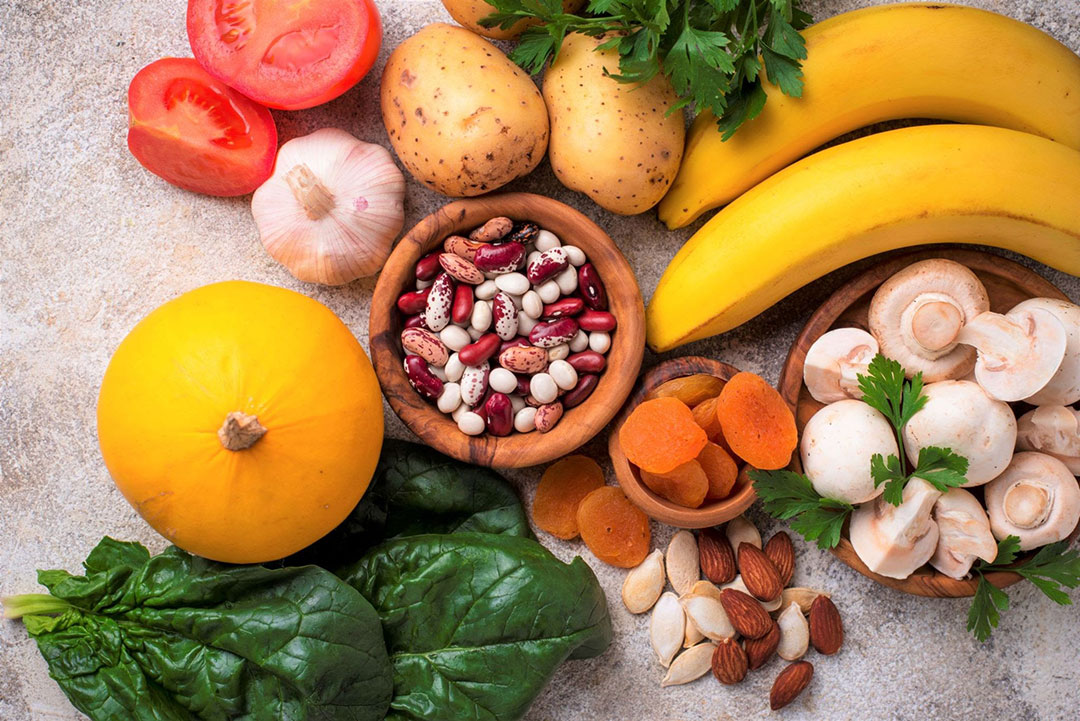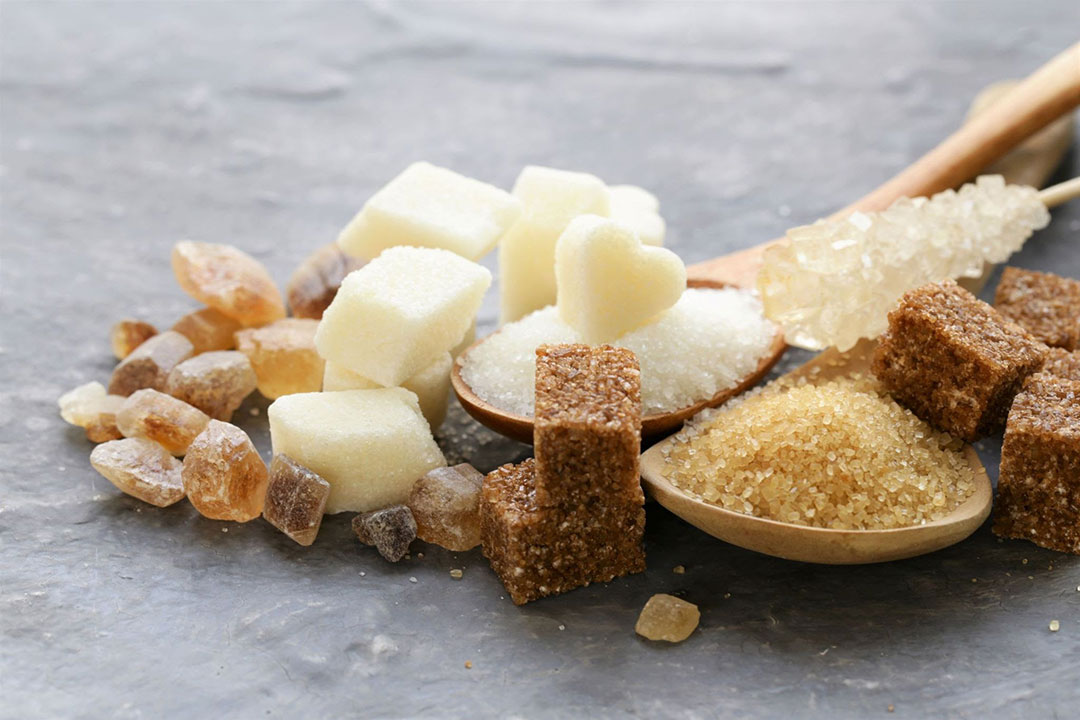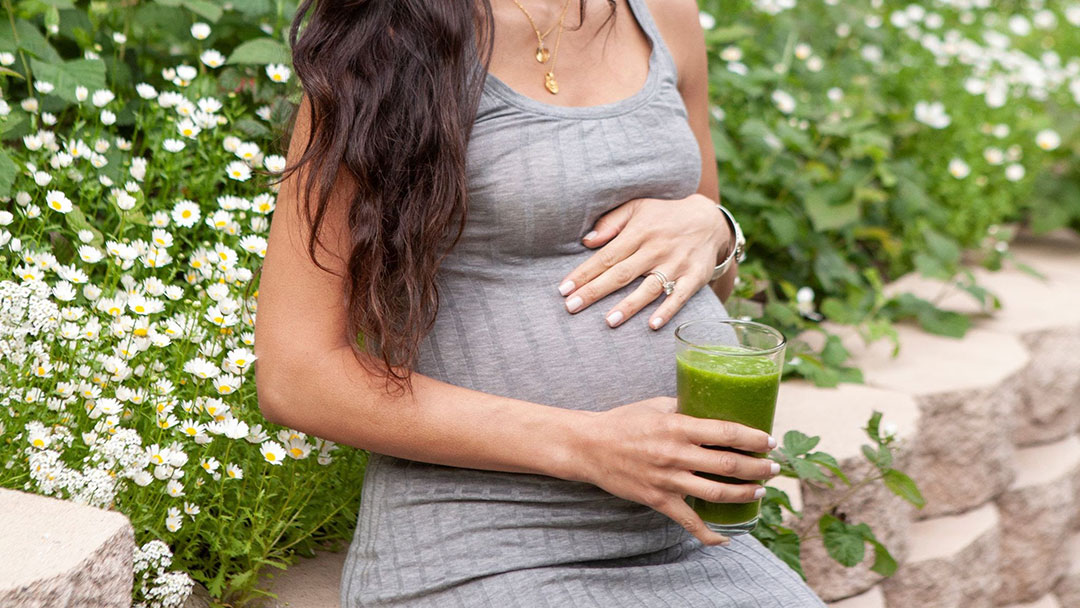Pregnancy is a very beautiful and intimate time in a woman’s life, but Beauties, it’s not always a walk in the park! Even when we’re doing our best with following the Four Cornerstones for a healthy pregnancy, sometimes we just don’t feel so great…
While some mamas only experience the normal discomforts of pregnancy like morning sickness or body aches, others may be dealing with other conditions like gestational diabetes. Fortunately, for most people gestational diabetes can be prevented with a proper diet, particularly a healthy plant-based diet before and during pregnancy.
This is great news for our plant-based Beauties and their growing families! If you haven’t adopted a plant-based diet yet, there are many benefits, including helping to prevent or better manage gestational diabetes.
The benefits of a high-fiber, plant-based diet cannot be overstated, especially for pregnant mamas! There are myths that plant-based diets are too high-carb for women who are at risk for gestational diabetes or who may already have it, but that’s all they are— myths! There is no “one size fits all” plant-based diet.
Vegan and vegetarian diets can be endlessly versatile and can be adjusted to suit anyone’s health or wellness needs, including fewer carbohydrates if that’s your concern. :)
But first, let’s take a look at what gestational diabetes is, and why it’s so important to prevent it.
What is Gestational Diabetes?
Gestational diabetes mellitus (GDM), most commonly known as gestational diabetes, is a condition that occurs only during pregnancy. It’s not the same as having Type 1 or Type 2 Diabetes before pregnancy though.
The hormones produced by a pregnant woman’s placenta, like estrogen and cortisol, prevent her body from using insulin effectively, which causes glucose to build up in the blood, rather than being absorbed by the body’s cells. 1
Experts aren’t sure what causes gestational diabetes, but it starts with either insulin resistance caused by the placenta and all its hormones, or by hyperglycemia, when too much glucose builds up in the blood. 2
Women who did not have diabetes prior to their pregnancies but develop elevated blood sugar during pregnancy develop gestational diabetes. The symptoms of gestational diabetes go away after delivery, but women with gestational diabetes during pregnancy are at a higher risk for Type 2 Diabetes later in life. 3
How Do I Know If I Have Gestational Diabetes?
Women are tested for gestational diabetes typically between the 24th and 28th weeks of their pregnancies. A glucose tolerance test given by your doctor can detect elevated blood sugar levels.
A high blood sugar level doesn’t automatically mean you have gestational diabetes, but it’ll become even more important to eat high fiber whole foods and be mindful of what you’re eating to keep your blood glucose level under control.
If you’ve already been diagnosed with gestational diabetes, a well-balanced diet and proper blood sugar monitoring can keep your symptoms under control and help ensure smooth delivery and a healthy baby.
Common risk factors for gestational diabetes include:
- Being overweight or obese
- Family History of Type 1 or Type 2 Diabetes
- Prediabetes 4
- Having previously given birth to a baby weighing more than 9 pounds
Is Gestational Diabetes Common?
Gestational diabetes affects between three and eight percent of all American women during their pregnancies. While gestational diabetes symptoms are temporary and easily treatable, they unfortunately can have negative effects on both mother and baby, including: 5
- High birth weights
- Increased risk for C-Section
- Preeclampsia, or high blood pressure
- Hypoglycemia, or low blood sugar
Thankfully Mamas, gestational diabetes is preventable! Like many health problems, gestational diabetes can potentially be prevented if you follow a healthy diet and lifestyle. But not just any healthy diet— a plant-based diet in particular can be very effective in preventing gestational diabetes.
Plant-Based Diets and Gestational Diabetes
There is an increased risk of gestational issues in women with diets that are low in natural, plant-derived foods. Inadequate consumption of fruits and vegetables increases the risk of conditions like preeclampsia, pregravid obesity, as well as pediatric diseases like diabetes. 6
How Plant-Based Diets Reduce Gestational Diabetes Risk
One recent study found that healthy plant-based diets appeared to enhance antioxidant compounds and decrease inflammation. During pregnancy this can improve insulin efficacy and provide many other benefits to mother and baby.
This positive effect on insulin sensitivity was present when the study’s participants were following either a vegetarian diet or a fully vegan diet. Nutrients such as dietary fiber found in whole foods and vegetables, and healthy fats like those found in nuts or olive oil were especially beneficial to the expectant mothers’ insulin efficacy. 7
Beauties, this is great news whether you are trying to prevent gestational diabetes, or treat pre-existing diabetes or prediabetes.
How Pre-Pregnancy Diets Can Prevent Gestational Diabetes
The benefits of a plant-based diet aren’t just during pregnancy either. Eating a plant-based diet before you’re pregnant can reduce your risk of gestational diabetes too. Researchers at the Harvard T.H. Chan School of Public Health found that women who followed healthy plant-based diets before pregnancy saw a 19 percent reduction in risk of gestational diabetes. This is great news for our plant-based mamas to be! 8
Another study found that pre-pregnancy diets low in fiber and high in glycemic load were associated with a higher risk of gestational diabetes. 9 More research is needed here, but this is an encouraging development and a good reminder to get plenty of fiber in your diet.
Gestational Diabetes and Red Meat
As if there weren’t enough reasons to stop eating meat already, studies have suggested that there is a link to red meat consumption and gestational diabetes.
In one analysis, total pre-pregnancy meat consumption was directly associated with a higher risk of gestational diabetes. This was especially notable with high consumption of red meat and processed meat. 10
The same risk does not exist for poultry, fish, or sources of vegetable protein however. Another study determined that consuming more vegetable or non-meat protein actually reduced the risk of gestational diabetes. In fact, the study found that eating just over half a serving of nuts per day can reduce gestational diabetes risk by 40 percent. That is a huge reduction! 11
More research is needed here also, but I think it’s safe to say that a high-fiber, plant-based diet is vital in preventing so many potential problems during pregnancy and beyond.
The Importance of a Healthy Plant-Based Lifestyle During Pregnancy
Proper prenatal nutrition is so important to a healthy pregnancy and lifestyle. Almost 1 in 11 Americans have diabetes, and the Standard American Diet (SAD) is a major contributor to this. However, high fiber diets such as plant-based diets, promote the growth of all kinds of healthy gut bacteria that are vital for keeping blood sugar and weight under control. 12
A healthy plant-based diet is full of fiber, healthy fats, vitamins and antioxidants, and is low in refined carbohydrates. It’s not only beneficial for mamas-to-be but also for women and their male partners during the conception stage— when trying to get pregnant! It helps you look and feel great during pregnancy, but a plant-based diet can help boost both partners’ fertility and make conception easier.
Nutrition for a Healthy Pregnancy
Eating wholesome plant foods and living a healthy lifestyle can significantly lower your gestational diabetes risk and help make your pregnancy a happy and healthy one.
Just like any diet though, it’s important to make sure your plant-based diet is balanced. This is so you and your baby can get all the nutrients you both need to live your healthiest lives. Make sure to get plenty of these nutrients in your diet:
- Complex carbohydrates including whole grain bread or pasta, oats and brown rice
- Plant-derived high-protein foods including beans, nuts, lentils and leafy greens
- Healthy unsaturated fats from sources including olive oil, chia seeds, and avocados
- Iron from sources including beans, nuts, seeds, leafy greens and mushrooms
- Zinc from sources like beans, nuts, seeds and oatmeal
- Calcium from sources like beans, seeds, and leafy greens
- Fatty acids from sources including chia seeds, flax seeds, brussels sprouts and walnuts
- Fiber-rich foods like beans, lentils, oats, brown rice and kale
There are other steps you can take towards a healthy pregnancy in addition to a balanced plant-based diet. Always stay hydrated and drink plenty of water. Be sure to take a whole-food-based prenatal vitamin and add supplements to your diet where needed. Some vital nutrients including DHA, EPA, Vitamin D, vitamin B12 and folic acid can be harder to get from food sources alone, so it’s important to add those to our diets with supplements.
It’s also important to get plenty of physical activity during pregnancy, but nothing too strenuous. Walking is very beneficial for pregnant mamas— I did it pretty much up to my due date!
Foods to Avoid
Just as it’s important to ensure some foods stay in your pregnancy diet, it’s important to keep others out. This includes foods like:
- Dairy
- Meat
- Artificial sweeteners including sugars and syrups
- Processed foods high in saturated fat and low in fiber, like fast foods or other junk
- Starchy vegetables including potatoes. (You don’t have to eliminate these entirely, just be sure to limit your consumption in favor of fiber-rich foods or complex carbs.)
How to Create a Gestational Diabetes Meal Plan
Wholesome, healthy food is an important cornerstone to making sure we’re feeling great and living our best lives. If you’re concerned about making healthy choices for you and your baby, meal planning is always a good option to consider, since it removes the guesswork of figuring out what to make for each meal.
Meal planning may seem like a tricky task, but it really isn’t! It can be as easy as making a dish and portioning it out over the course of a few days. (If you do this, just be sure to mix it up so you get all the nutrients you and your baby need.)
When planning your meals, be sure each of them include healthy sources of protein, carbs, and fat. This is especially important for pregnant mamas with gestational diabetes.
To create your own meal plan, follow these easy steps:
- Figure out your schedule for the week
- Choose your recipes according to your schedule (Got lots of time to cook on Monday, but not on Tuesday? Save a faster recipe for Tuesday)
- Buy groceries according to what you will need for your meal plan
- Follow your schedule and get cooking! :)
Whether you’re looking for options for meal planning or a quick and easy snack, check out some of my recipes. These satisfying and nutritious recipes prove that the healthy choice doesn’t have to be the bland or flavorless one!
Entrees
- The Mama Nourishment Bowl
- Easy Vegan Squash Gratin
- Brain Boosting Seaweed Salad
- Conception Grounding Veggie Bowl
- Ginger Portobello Bok Choy Stir-Fry
Snacks & Smoothies
Fun fact: Smoothies are full of healthy fiber that help to stabilize your blood sugar. Compare this to fruit juice, which doesn’t have that fiber, and can spike your blood sugar!
- Glowing Green Smoothie (GGS)
- Power Protein Pregnancy Bites
- Tropical Berry Fruitfulness Smoothie
- Raspberry Banana Acai Nicecream
- Feel Boosted Lemon Poppy Seed Bites
Mamas, if you are experiencing gestational diabetes or are concerned about your risk and want a more formalized plan, don’t worry. A registered dietitian experienced in GDM can help you come up with a customized plant-based diet plan for your pregnancy too.
If you’re not already used to the lifestyle, a plant-based or vegan pregnancy might seem daunting at first, but it is so worth it not only for your health but for Baby’s too. Gestational diabetes can be a worrisome prospect, but thankfully, it doesn’t have to be.
Courses for an Easeful Pregnancy Journey
Pregnancy is a beautiful and profound time in a woman’s life. If this is your first pregnancy (congratulations, mama!) or if you’re trying to conceive, then you probably have a lot of questions. Your fertility, pregnancy, and postpartum journeys should be as easeful as possible, and I want to help you achieve that.
For all new mamas and mamas-to-be, I want to invite you to my upcoming pregnancy courses. There are so many misconceptions and questions about vegan or vegetarian diets before, during and after pregnancy and not a lot of great resources to support women during these important periods.
This is why I’m creating three courses for each stage of your journey to motherhood, including the fertility & healthy conception period, pregnancy, and the postpartum & breastfeeding period.
If you have questions about your personal journey, big or small, I encourage you to check it out and we’ll notify you when they’re available :)
Suggested Resources
Overcoming Adrenaline and Hormonal Imbalance with Dr. Michael E. Platt
10 Must Eat Beauty Foods For Pregnancy (and How to Deal with Some of the Cravings!)
Incorporating a Plant-Based Lifestyle During Pregnancy and Beyond
How to Balance your Hormones on a Plant-based Diet with Dr. Neal Barnard
Citations
-
- “Gestational Diabetes Mellitus (GDM).” Johns Hopkins Medicine, www.hopkinsmedicine.org/health/conditions-and-diseases/diabetes/gestational-diabetes.
- “Gestational Diabetes.” Gestational Diabetes — Symptoms, Treatments | ADA, www.diabetes.org/diabetes/gestational-diabetes.
- “Definition & Facts of Gestational Diabetes.” National Institute of Diabetes and Digestive and Kidney Diseases, U.S. Department of Health and Human Services, www.niddk.nih.gov/health-information/diabetes/overview/what-is-diabetes/gestational/definition-facts.
- “The Surprising Truth About Prediabetes.” Centers for Disease Control and Prevention, Centers for Disease Control and Prevention, 11 June 2020, www.cdc.gov/diabetes/library/features/truth-about-prediabetes.html.
- “Gestational Diabetes and Pregnancy.” Centers for Disease Control and Prevention, Centers for Disease Control and Prevention, 14 July 2020, www.cdc.gov/pregnancy/diabetes-gestational.html.
- Pistollato, Francesca, et al. “Plant-Based and Plant-Rich Diet Patterns during Gestation: Beneficial Effects and Possible Shortcomings.” Advances in Nutrition (Bethesda, Md.), American Society for Nutrition, 15 Sept. 2015, www.ncbi.nlm.nih.gov/pmc/articles/PMC4561836/.
- Schiattarella, Antonio, et al. “The Impact of a Plant-Based Diet on Gestational Diabetes: A Review.” Antioxidants (Basel, Switzerland), MDPI, 2 Apr. 2021, www.ncbi.nlm.nih.gov/pmc/articles/pmc8065523/.
- McCall, Becky. “Gestational Diabetes Cut With Plant-Based Diet Before Pregnancy.” Medscape, Medscape, 26 July 2020, www.medscape.com/viewarticle/932548.
- FB;, Zhang C;Liu S;Solomon CG;Hu. “Dietary Fiber Intake, Dietary Glycemic Load, and the Risk for Gestational Diabetes Mellitus.” Diabetes Care, U.S. National Library of Medicine, pubmed.ncbi.nlm.nih.gov/17003297/.
- Marí-Sanchis A;Díaz-Jurado G;Basterra-Gortari FJ;de la Fuente-Arrillaga C;Martínez-González MA;Bes-Rastrollo M; “Association between Pre-Pregnancy Consumption of Meat, Iron Intake, and the Risk of Gestational Diabetes: the SUN Project.” European Journal of Nutrition, U.S. National Library of Medicine, pubmed.ncbi.nlm.nih.gov/28285431/.
- Gray, Nathan. “Red and Processed Meat Consumption Linked to Gestational Diabetes, Warn Experts.” Foodnavigator.com, William Reed Business Media Ltd., 13 Dec. 2013, www.foodnavigator.com/Article/2013/12/13/Red-and-processed-meat-consumption-linked-to-gestational-diabetes-warn-experts.
- Goodman, Brenda. “Enlisting Gut Bacteria And Fiber To Fight Diabetes.” WebMD, WebMD, 9 Mar. 2018, www.webmd.com/diabetes/news/20180309/enlisting-gut-bacteria-and-fiber-to-fight-diabetes.






0 Comments